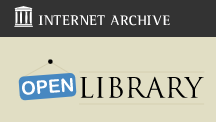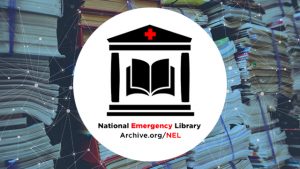The Internet Archive has just released a new trove of online content, in the form of what they call The Open Library – 1.2 million ebooks, easily accessible and entirely free. The long-running website is now calling itself the National Emergency Library – and in the COVID-19 environment, with  educators from graduate level courses to K-12 teaching online for the first time, the need for course materials and educational content has taken on a new urgency. Correspondingly, news of the Open Library has circulated far beyond the immediate library world, garnering press coverage from Vice, The Guardian, The New Yorker, and more.
educators from graduate level courses to K-12 teaching online for the first time, the need for course materials and educational content has taken on a new urgency. Correspondingly, news of the Open Library has circulated far beyond the immediate library world, garnering press coverage from Vice, The Guardian, The New Yorker, and more.
But, is this legal? Vice reports the free books as “controversial” – citing the pushback from some authors and (more vocally) publishers. The Authors Guild calls the site “piracy,” and furthermore “an excuse to push copyright law further out to the edges, and in doing so, harm authors, many of whom are already struggling.” The Association of American Publishers likewise calls the move “aggressive,” and joins the Society of Authors in threats of legal action.
The Internet Archive has written in response, “This was our dream for the original Internet coming to life: the Library at everyone’s fingertips.” Indeed, the site has grown vastly since 1996, when its main purpose was to archive the internet (or, “world wide web”) – something they achieved and made public through the Wayback Machine. The mission statement is as broad as its collections development, centered around a single, ambitious goal: “to provide Universal Access to All Knowledge.”
 So, is this a bold example of 21st century literary piracy, or a publicly responsive invocation of Fair Use? The New Yorker, citing the “sheer pleasure of browsing”, perhaps oversimplifies the case: “Libraries have copyright superpowers that they can use in an emergency.” In what sense, one might ask, is this a library? Users are given the unique opportunity to “sponsor” a book – by a one-time donation, making that book available to additional users.
So, is this a bold example of 21st century literary piracy, or a publicly responsive invocation of Fair Use? The New Yorker, citing the “sheer pleasure of browsing”, perhaps oversimplifies the case: “Libraries have copyright superpowers that they can use in an emergency.” In what sense, one might ask, is this a library? Users are given the unique opportunity to “sponsor” a book – by a one-time donation, making that book available to additional users.
Judging from the public response, there is a growing interest in openly-available resources – and it may be more of a challenge to return to the restrictive, traditional boundaries of copyright when the crisis is over.
Print this page




Leave a Reply